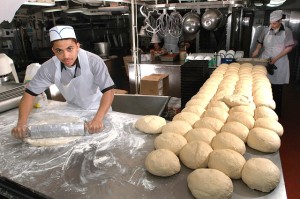baker [noun] [de bakker, de bakkers] [‘bak-kur’]
 Besides the person who bakes bread, in Dutch “bakker” is also used to refer to the bakery (shop), see the Examples. Note that a “bakery” is a “bakkerij” in Dutch. The ending in “ij” is common and you will see it in other words like “makelaardij”, “schoenmakerij”, “slagerij” etc. (it is comparable to the Spanish “ía”).
Besides the person who bakes bread, in Dutch “bakker” is also used to refer to the bakery (shop), see the Examples. Note that a “bakery” is a “bakkerij” in Dutch. The ending in “ij” is common and you will see it in other words like “makelaardij”, “schoenmakerij”, “slagerij” etc. (it is comparable to the Spanish “ía”).
We use “warme bakker” to refer to a bakery where the bread is actually baked, instead of a shop where the bread is just sold but not baked.
Examples:
– “Liefie, ik ga even brood halen bij de warme bakker op de hoek.”
(“Sweetie, I’m going to get some bread at the (fresh) bakery at the corner.”)
– “Bakker zijn is een zwaar beroep, iedere dag om vier uur ‘s ochtends op…”
(“Being a baker is a tough profession, (one has to) get up at 4 o’clock in the morning every day …”)
– “Raad eens wie ik bij de bakker tegenkwam? Frank….met z’n nieuwe vriendin….”
(“Guess who I ran into at the bakery shop? Frank…with his new girlfriend…” Note that “eens” is not translated here, it means something like “one time” or “just”.)
Expressions:
– “Dat komt voor de bakker!”: “(Consider it) done!” Lit.: “That comes for the baker!”
Example:
– “Op een ochtend werd ik wakker, toen was alles voor de bakker.”
(“One morning I woke up, and everything was taken care of.”)
– “Zoete broodjes bakken”: to eat humble pie, to butter someone up, to suck up.
– “Er niks/niets van bakken”: to mess up.
Example:
– “De nieuwe spits van PSV bakt er niets van!”
(“PSV’s new forward stinks!”)
Related words:
– “Bakkerij”: bakery.
– “Bakken”: to bake.
– “Oven”: oven.
– “Slager(ij)”: butcher(‘s shop).


